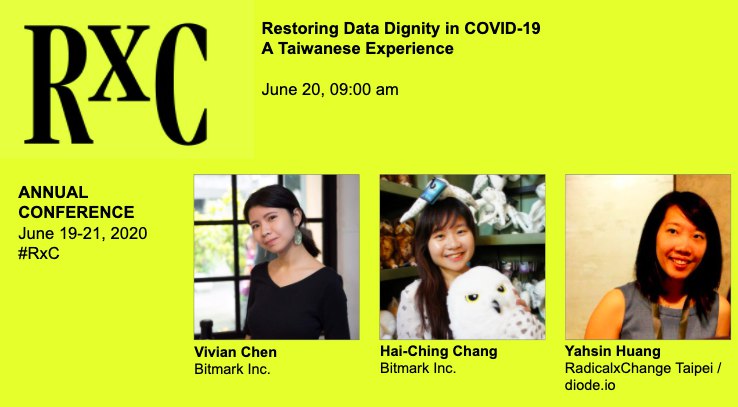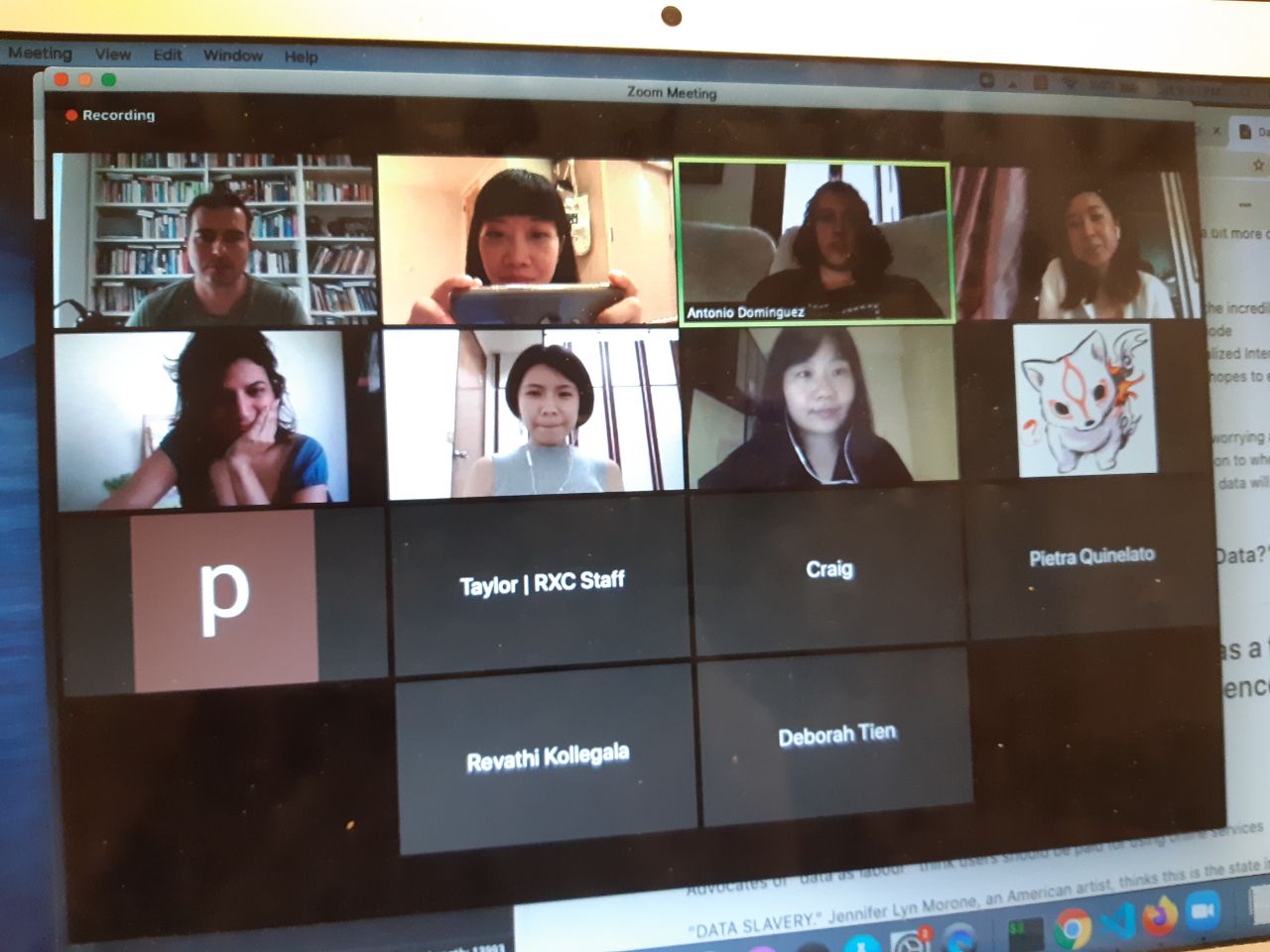I Ran My First Online Workshop with Bitmark at RadicalxChange Conference Last Month

On Saturday (6/20) last month, I ran a 1-hour data dignity workshop with the Bitmark team at a big RadicalxChange conference event. The workshop was called “Restoring Data Dignity in COVID-19: A Taiwanese Experience”; the primary goal was to gather knowledge from every participant to brainstorm ways to gain awareness on health data. There were three facilitators: Vivian Chen (陳依靖), community advocate at Bitmark, Hai-Ching Chang (張海淨), marketing manager at Bitmark, and I (leader of RadicalxChange Taipei group, marketing manager at Diode).

Vivian invited me to speak at the workshop (the entire workshop was designed by Vivian and her colleague Hai-Ching!) and talk about the concept of Data as Labor, so that was what I did.
Watch the livestream-ed YouTube video (my part starts at 4:10).
Here’s a slightly edited script of what I said at the beginning of the workshop:
Data provided by humans can be seen as a form of labor
“Data as Labor” is one of the key concepts discussed in the Radical Markets book. The book was published in 2018; the Traditional Chinese translation《激進市場》was published last month, in May this year (2020). The idea is data can be treated as a form of labor. Data provided by humans, so ordinary people like us, can be seen as a form of labor.
Data work that we’re talking about here can take many forms. Data work could be posting social-media posts, liking social-media posts, listening to music, recommending restaurants. When you do these kinds of activities, you’re doing the kind of work that tech companies would like you to do. Because the AI algorithms that tech companies are developing can’t understand the information themselves – they need to be fed with data. For example, when you do an Internet search with a specific keyword, the activity of choosing which search result to click teaches the search engine how to give you a more customized search result next time for that specific keyword. (Learn more from Chapter 5, Radical Markets)
The Jennifer Lyn Morone Project
So these all sound pretty abstract. A great creative work that I think illustrates this concept really well is Jennifer’s project in 2014. Jennifer Lyn Morone is an American artist, also the CEO of RadicalxChange Foundation. She came to RadicalxChange Taipei’s first meetup event in July last year (2019). What Jennifer did was she registered herself as a company in Delaware as part of a protest project. Things like her identity, such as name, appearance, and IP addresses are trademarked. They become assets that she can now capitalize on. She believed that if people have ownership and control of their data they should be the ones compensated for it, not other companies.
The problem is the collection and exploitation of personal data is mostly dominated by big tech firms. So big tech companies such as Facebook and Google, what they’re doing is they are making money from your personal data. They’re selling ads to customers with the large amount of data they’re collecting. Data suppliers, online users like us, are not properly rewarded in that sense. We’re not properly compensated for our digital contribution.
Data-labor unions as gatekeepers of our data
Another idea that the book authors mentioned in the chapter was this idea of forming the so-called “data-labor unions”. So, organizations that would serve as gatekeepers of our data. The idea is these data-labor unions will negotiate rates on behalf of people, monitor the data work, the quality of the data work, and even organize strikes if needed. And so I think what makes these workshops valuable is we have leaders like Vivian and Hai-Ching who are attracting like-minded leaders, and who are willing to show up and invest in a ton of time and energy to start these kinds of dialogues and discussions that are necessary and important to make a difference, that today’s workshop is really about giving us a unique opportunity to envision the future that we would want to live in.
What if the tech companies were required to pay for access
This is why we attend RadicalxChange events. Because we believe in our capacity to evolve, our capacity to grow. The data economy is growing. What would our desired future look like? What if we really controlled our data? What if the tech giants were required to pay for access to our data? This is why companies like Bitmark are interesting. They recently left Facebook, which I think is a brave move for any companies based in Taiwan.

Group discussions
After my brief 5-minute introduction, Vivian took over and introduced Bitmark’s Autonomy, the neighborhood public health forecasting tool. We then broke out into three groups. The discussion was about using the “5 Whys” technique that Vivian introduced to explore more on “why don’t people care when their health data are abused?”
Group A (with Vivian) came to the conclusion: The mainstream media and most of the information spreading channels are controlled and manipulated by the big corps. People couldn’t gain digital literacy through these channels, thus couldn’t understand how the big corps or governments used their data.
Group B (with Hai-Ching) had the conclusion: People don’t get to know how their data are used by big companies, because none of the companies publicize what they do with the data. Also, revealing too much information might be bad for their profits.
Group C (with Yahsin) went to the conclusion: In some countries, there’s no real alternatives. There’s no way to get access to the services big companies provide if you don’t provide your personal data. In Europe, the data are actually not accessible and transparent enough, because people do not easily trust others with their data.
What would the desired future look like?
I’ve been watching Bitmark and RadicalxChange Foundation closely. I don’t know why I do that. I guess in part it’s because I’m curious about a lot of things. For instance, I’m keen to know how leaders like Sean Moss-Pultz, CEO of Bitmark would think of the future; how people like Glen Weyl, founder of the RadicalxChange Foundation; Vitalik Buterin, creator of Ethereum; Audrey Tang, Taiwan’s digital minister, are imagining the future. What would an ideal data economy look like? What would our desired future economy look like? I think that this is what Bitmark, one of the most ambitious blockchain startups I’ve ever seen in Taiwan, wants to achieve. It’s what my company Diode, a blockchain firm building Web3 decentralized Internet infrastructure, wants to achieve; it’s what RadicalxChange Taipei group hopes to explore.
Oftentimes I feel like it’s not so much that my career is on fire but more that my intellectual curiosity is on fire – simply being around with great thinkers, and being surrounded by so many interesting ideas! The RadicalxChange Taipei folks recently got invited by a blockchain podcast host to be on the show (this Friday!) to talk about some of the key concepts of Radical Markets, give updates to their listeners of what RadicalxChange Foundation and its global chapters have been up to, so I’m really looking forward to it!